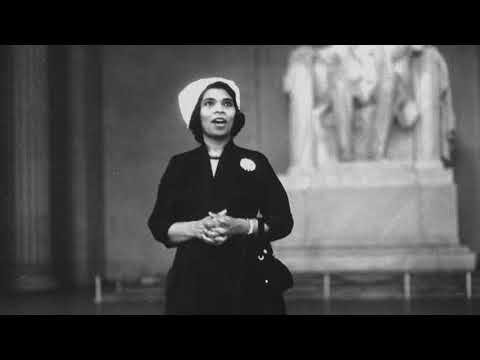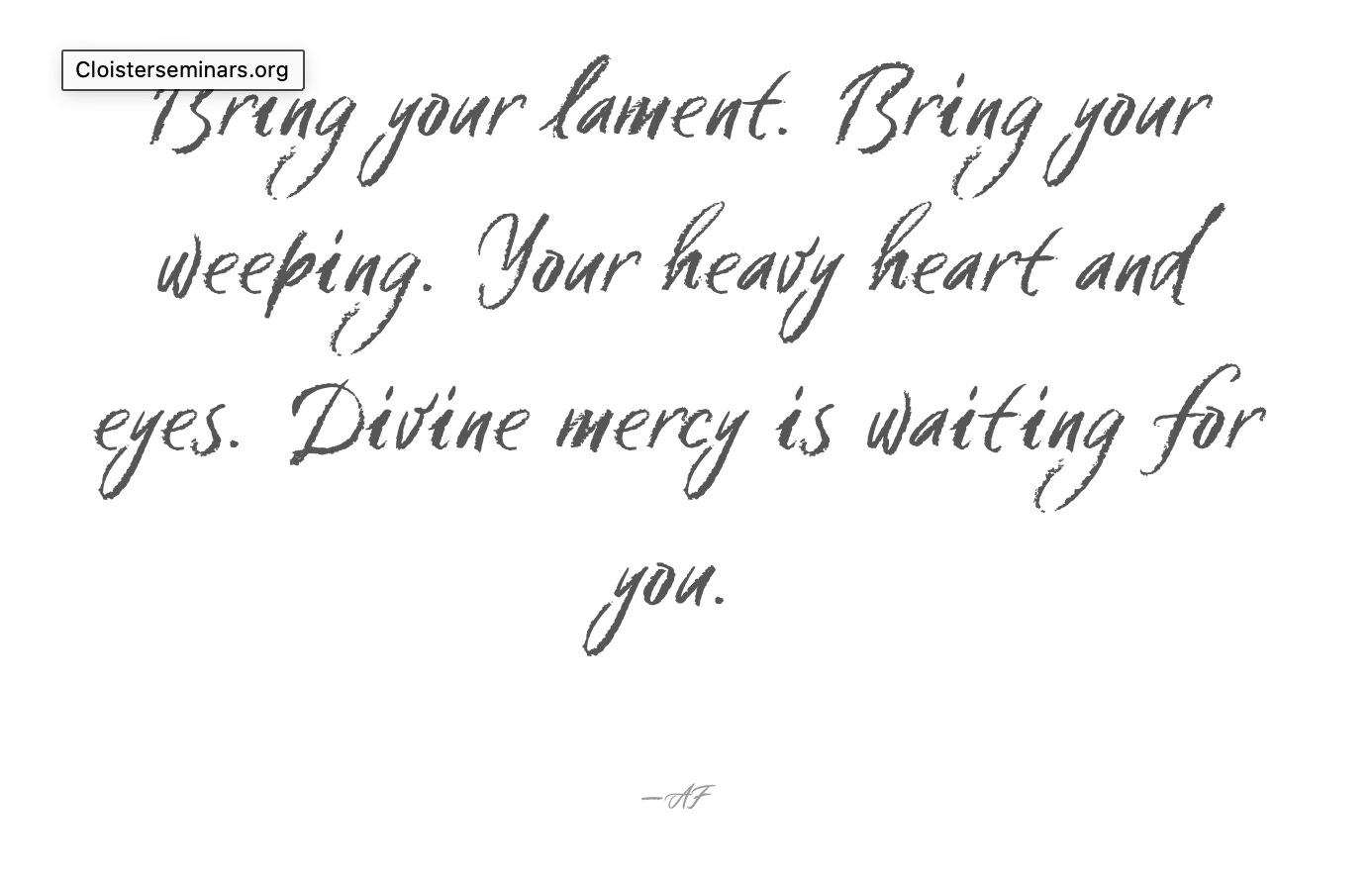Entering Passion week in a pained world.
Let this haunting performance of JS Bach's Aria "Have mercy" by Marian Anderson and the pictures of her 1939 performance at the Lincoln Memorial move your heart and the heart of this world.
“Erbarme dich, mein Gott” (Have mercy, my God) from The St. Matthew Passion1
In Memoriam: Marian Anderson (1897-1993)
This is the first of our Passion Week Consolations 2024. If you wish to journey with us, and to receive our daily consolations in your inbox make sure you have chosen the paid subscription tier. If you need a stipend for this journey, or wish to send your offering another way, please respond to this email and I will comp you in asap. Also, you can manage your subscription here.
Dear fellow pilgrim,
I have always loved JS Bach’s Aria “Erbarme Dich” from his Matthew Passion, and I have heard many moving interpretations over the years, some when singing in the Bach choir at the Munich philharmonic myself.
But when I came across this interpretation by Marian Anderson from almost eight decades ago, my heart broke open. The pain of a whole year watching this world spiral deeper and deeper into war and division and apocalyptic news stories, poured out through my tears.
It became immediately clear that I must share this haunting piece with you. Must beg you to pause and to listen and to let your heart be moved, so we can move this pained world together. Must beg you to share it with another soul who will share it with another soul so we all together can join into a communal lament calling out for Divine mercy for our pained world and our pained hearts.
So before peeling off the many layers of the story (some context is also given in the video itself) I invite you to take 8 min out of your day today and immerse yourself in the complexity and beauty of this performance, in the layers of personal and national history, and the bearing of pain and guarding of hope shared across the centuries.
Listen with your heart, if you can. Do not be afraid of your tears. We will dry them later.
Erbarme dich, mein Gott,
um meiner Zähren willen!
Schaue hier, Herz und Auge weint vor dir
bitterlich.
**Have mercy, My God,
for my tears' sake;
Look hither, heart and eyes weep before thee
bitterly.
Peeling off the layers
Bach’s aria “Erbarme Dich” in his St Matthew Passion is probably the most famous and beloved of the arias. In repetitive movements, the singer leans into her aching heart and the need for Divine mercy, supported by a few old instruments mimicking the heart’s weeping.
With his Passion JS Bach has created a grand lamentation. His music offers us a container for our sorrows and seduces us into beautiful lamentation.
Joining in this orchestrated experience of mourning can be self-soothing and a strategy for resilience in the face of tragedy.
Renowned contralto Marian Anderson was born in Philadelphia on February 27, 1897 and was described by famed Italian conductor Arturo Toscanini as a voice that comes along "once in a hundred years."
On April 9, 1939 Marian Anderson performed in-front of the Lincoln Memorial because she was denied access to Constitutional Hall by the Daughters of the American Revolution (DAR) because of her race.
First Lady Eleanor Roosevelt was a member of the DAR. Outraged by their decision, she famously resigned from the organization. This well-publicized controversy led to an invitation, sponsored by hundreds of Washington’s elite, to sing on the steps of the Lincoln Memorial.
A crowd of more than 75,000 people, came out to hear and support her, broadcasted live to millions more.2
1939 was a year of turning and foreboding around the world. It was the year when Europe fell into the most ugly and unforgiving war of the last century. It was still the height of the brutal Jim Crow South and the Great Migration of black people away from the oppression in the South on the American continent.
This passion story is the story of race discrimination that denied an accomplished musician her stage, redeemed by the heroic resistance of leaders and a silent crowd of 75,000 people at the heart of the nation.
“The incident”, writes Jeffrey Stevers, who created this haunting version of the 1939 concert pictures paired with the 1946 recording of the Bach Aria, “put both the artist and the issue of racial discrimination in the national spotlight.”
Marian Anderson “was the first African American singer to perform at the White House and the first African American to sing with New York's Metropolitan Opera.
She sang for the inaugurations of Dwight D. Eisenhower and John F. Kennedy. In 1957, she toured India and the Far East as a goodwill ambassador through the U.S. State Department.
The recipient of numerous awards and honors, Anderson was awarded the Presidential Medal of Freedom in 1963, the Congressional Gold Medal in 1977, the Kennedy Center Honors in 1978, the National Medal of Arts in 1986, and a Grammy Lifetime Achievement Award in 1991.”
Lament and Courage
I have always believed that changing one heart will change our world. And that starting with my own heart is the most difficult place to begin.
The world did not change immediately after this incredible concert in 1939 which moved the US and the world, nor the recording of the Bach Aria in 1946. And still, courage has taken hold and change has been brought to the hearts of many.
And then there was the courage of First Lady Eleanor Roosevelt. She was a member of the DAR. Outraged by their decision to deny Anderson access to the concert Hall because of her race, she famously resigned from the organization.
Changing one heart, dear people, is still what changes the world. Changing the heart of that one person who says “enough is enough,” I cannot bear this any longer, I must hold to what is humane and what is true.
The passion story isn’t a story of power and might. It does not teaches greatness but humility. It doesn’t pit race against race, religion against religion, or right against left.
The way of the cross leads us to lean into mercy, not might.
“Have mercy, My God, for my tears' sake;
Look hither, heart and eyes weep before thee bitterly.”
A blessing for your Passion Journey
Worried, sorrowful, hopeful,
let us now come as we are
and walk together
holding our sorrows
and the sorrows of this world
towards the glimmering
Easter light
of renewed life.
And may Divine mercy walk among us.
With love, Almut
PS: Leave a heart or a phrase, a word, or a line which resonated with you in the comments section so we know you have been here. 🙏
For the subscribers of our Passion Journey
Dear fellow pilgrims, thank you for being here, for sustaining this journey and for trusting me with it through this Holy Week. Tomorrow’s post will gather us for our pilgrimage in a more intimate setting of paid subscribers (here is how to upgrade) as we will let our heart follow the movement of this week and Bach’s Passion oratorio. All you need to bring is a window of undisturbed time throughout the day (20 min is advised) and an open heart. Some also reserve a longer time on Holy Saturday as a private retreat to read or re-read each of our daily Consolations.
If you are a paid subscriber but do not wish to receive daily passion week emails you can toggle them off here.
If you are in need of a stipend to participate or wish to send your offering another way please respond to this email and I will comp you in asap.
About Almut
, Dr. phil., Dipl. Psych. is a German American scholar and practitioner, a psychologist turned philosopher turned writer, traveler, photographer, retreat leader and mother of a pre-schooler. She has taught and published on authors like Kierkegaard, Buber, Frankl, Yalom, Edith Stein, and Hildegard of Bingen. Almut is also a Benedictine Oblate and lives with her family in a little college town in the upper midwest.BWV 244 by Johann Sebastian Bach (1685-1750)
Marian Anderson, contralto
Joseph Fuchs, solo violin
RCA Victor Chamber Orchestra Robert Shaw, conductor
Recorded June, 1946
See Jeffrey Stevers comment here. He created this moving version merging the visuals of 1939 with the recording of 1946. For a brief report on this concert and the music performed see Cary O’Dell’s article.







"So we all together can join into a communal lament calling out for Divine mercy for our pained world and our pained hearts." These words describe the sorrow I feel for our world today and with the continued pain we inflict upon one another.
Thank you for your beautiful blessing. May we embrace this blessing everyday. May we in our broken, human way recognize the mercy that is accompanying us always. Letting go of feeling "we" are/can/should be in control and choosing instead to rest in the mystery of not knowing.
I have to trust that God offers something more to those who are trying to survive in all the war-torn places in our world. I know I can't change their situation and as you wrote, I can only choose to change my heart. Perhaps that is where I must begin - by sending love to those who are struggling in unbearable situations.
Blessings to all as we journey along...and thank you Almut for offering us beautiful "footholds" along the way.
Powerful stuff! Her pronunciation (and her singing) is impeccable. Truly a grand way to call the iniquities that have separated us from ur God–as Isaiah had it–to mind. Time to pray, and pray hard...